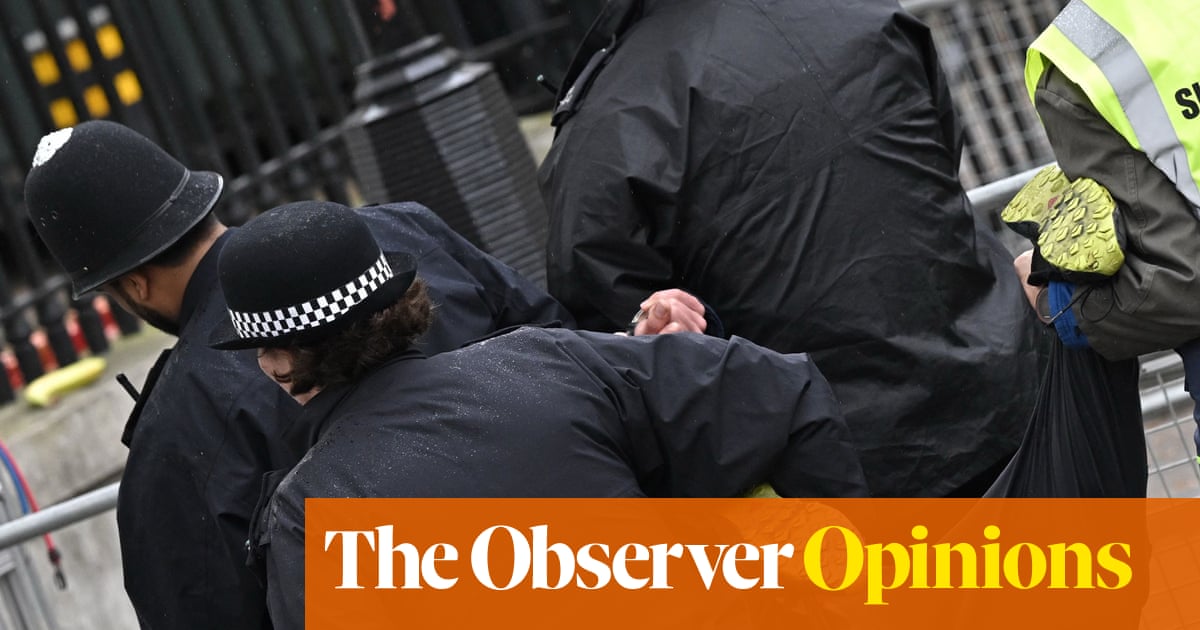
For many, the coronation will have passed by in a blur of pomp, quiches, bunting, fireworks... and rain. But for the anti-monarchy campaign group Republic, things took an altogether more sinister turn.
Its chief executive and several other protesters were bundled into a police van yesterday after being arrested at a peaceful protest in Trafalgar Square. It followed a letter from the Home Office last week that informed them of new police powers to curb protest and harsher criminal penalties for protesters. “I would be grateful if you could forward this letter to members likely to be affected,” it ominously suggested.
These arrests by the Met took place in the context of new laws ushered in by increasingly authoritarian home secretaries. Priti Patel introduced new measures to give ministers wide powers to define the conditions under which the police can impede protest. Suella Braverman has gone further still: her freshly enacted Public Order Act says the police have the right to impose conditions if anyone is hindered “to more than a minor degree”, to stop and search anyone without suspicion, and imposes what the UN has called “disproportionate” criminal sanctions on peaceful protesters.
The most obvious way of making sense of this is as a rightwing authoritarian government cracking down on eco-protesters, republicans and anti-racist campaigners. Braverman has made no secret of having the “tofu-eating wokerati” in her sights. But it also gives the police much wider discretion to decide what is and isn’t lawful protest. “We will deal robustly with anyone intent on undermining this celebration,” the Met tweeted last week, seemingly unaware that “undermining” royal festivities is not (yet) unlawful.
These sweeping powers should concern all democrats. The police are supposed to treat citizens impartially, regardless of their belief. But they have a poor track record, and not just when it comes to republicans.
Take, for example, the egregious way the police have clamped down on the free speech of those who express the “gender critical” belief, protected in equalities law, that sex is binary, immutable and relevant in society. The police should be scrupulously neutral on this. Yet in recent years they have adopted the controversial position of campaigners who believe that gender identity can replace sex altogether – that being a woman is not a biological reality but instead about conforming to feminine stereotypes or a matter of inner identity, and that it is somehow “hateful” to deviate from this view.
That has led them to warn off citizens from making lawful political statements. Former policeman Harry Miller was visited by a police officer as a result of his tweets – mostly “opaque, profane or unsophisticated”, according to a judge, but well within his rights to post. There are plenty of other examples: one woman recorded herself being berated by a police community support officer for having a sticker “trans ideology erases women” in her window. A feminist activist was arrested and detained in custody for 12 hours by Gwent police on suspicion of displaying “threatening or abusive writing” after reports she had put up stickers including slogans such as “no men in women’s prisons” and “humans never change sex”. Police raided her home and, extraordinarily, confiscated a gender critical book, presumably as evidence of “wrongthink”. There are also cases of the police taking to social media to berate people for their gender critical perspectives, such as when Sussex police reprimanded someone on Twitter for saying that a convicted paedophile who identifies as a woman is biologically male, declaring: “Sussex Police do not tolerate any hateful comments towards their gender identity.”
This is not OK. Miller taking the police to court has given judges the opportunity to make this clear. “In this country we have never had a Cheka, a Gestapo or Stasi,” the high court warned in relation to his case. The courts ruled in 2021 that both the specific police action against Miller and the College of Policing guidance used to justify it were unlawful.
This guidance tells police forces to record as non-crime hate incidents anything – including social media posts – reported to the police that is perceived by the person reporting to be motivated by hostility, including “unfriendliness”. It is wide open to manipulation by those looking to threaten people they disagree with into silence, and by police officers who wrongly believe it is transphobic to think that sex is real and immutable.
You might think this would have led to a transformation in policing of political speech. But the other cases above happened after the court ruling. The College of Policing guidance still hasn’t been properly revised. The Home Office released a statutory code of conduct on non-crime hate incidents earlier this year; it makes clear that the police cannot simply rely on the perception of the complainant before recording an incident and includes an example illustrating the police obligation to protect gender-critical free speech. The College of Policing reacted with its own new draft guidance that waters down the Home Office code and takes out the gender-critical example altogether, replacing it with one that includes the police removing undefined “anti-transgender” posters.
This suggests that the College of Policing has been rendered unable by a degree of ideological capture to respond to the courts ruling its guidance unlawful. Two years ago, half of police forces paid the charity Stonewall – whose chief executive has outrageously compared gender-critical belief to antisemitism – for diversity training. Yet freedom of information requests reveal that many police forces are not properly training their officers on the law on free speech, and there are many examples of the police stating the law incorrectly to the public.
It isn’t just politicians on the right giving way more discretion to the police, either. In Scotland, the SNP has introduced draconian hate-crime legislation that gives the police expansive powers to go after people for “stirring up hatred” online with insufficient protections for free speech.
There are several important takeaways. Some in the police love a moral crusade; just look at the zealous over-policing of lockdown, which saw officers slap fines on people for taking coffee on a walk and using drone footage to shame people for exercising outdoors. Combine that inclination with the potential for the police to become ideologically captured, and there are serious implications for democracy.
And finally, the authoritarian strain that sees politicians hand dangerous levels of unaccountable power over to the police is certainly not confined to the right; it comes in a progressive “be kind” flavour too.
Sonia Sodha is an Observer columnist












